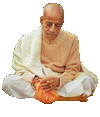|
 Home Home
 Photo Album Photo Album
 Srila Prabhupada Srila Prabhupada
 Favorite Quotes Favorite Quotes
 Vegetarianism Vegetarianism
 Reincarnation Reincarnation
 What is a Guru? What is a Guru?
 Games Page Games Page
 Links Page Links Page

Please Email with your comments or
suggestions. I appreciate your input.
|
His Divine Grace A.C. Bhaktivedanta Swami Prabhupada
|

Srila Prabhupada chanting Japa.
|

|
|
|
|
His Divine Grace A. C. Bhaktivedanta Swami Prabhupada
appeared in this world in 1896 in Calcutta, India. He first
met his spiritual master, Srila Bhaktisiddhanta Sarasvati
Gosvami, in Calcutta in 1922. Bhaktisiddhanta Sarasvati, a
prominent religious scholar and the founder of sixty-four
Gaudiya Mathas (Vedic institutes) in India, liked this
educated young man and convinced him to dedicate his life to
teaching Vedic knowledge. Srila Prabhupada became his
student and, in 1933, his formally initiated disciple.
At their first meeting Srila Bhaktisiddhanta Sarasvati
requested Srila Prabhupada to broadcast Vedic knowledge in
English. In the years that followed, Srila Prabhupada wrote
a commentary on the Bhagavad-gita, assisted the Gaudiya
Matha in its work, and, in 1944, started Back to Godhead, an
English fortnightly magazine. Single-handedly, Srila
Prabhupada edited it, typed the manuscripts, checked the
galley proofs, and even distributed the individual copies.
The magazine is now being continued by his disciples in the
West.
In 1950 Srila Prabhupada retired from married life,
adopting the vanaprastha (retired) order to devote more time
to his studies and writing. He traveled to the holy city of
Vrndavana,where he lived in humble circumstances in the
historic temple of Radha- Damodara. There he engaged for
several years in deep study and writing. He accepted the
renounced order of life (sanyasa) in 1959. At
Radha-Damodara, Srila Prabhupada began work on his life's
masterpiece: a multivolume commentated translation of the
eighteen-thousand-verse Srimad-Bhagavatam (Bhagavata
Purana). He also wrote Easy Journey to Other Planets.
After publishing three volumes of the Bhagavatam, Srila
Prabhupada came to the United States, in September 1965, to
fulfill the mission of his spiritual master. Subsequently,
His Divine Grace wrote more than fifty volumes of
authoritative commentated translations and summary studies
of the philosophical and religious classics of India.
When he first arrived by freighter in New York City,
Srila Prabhupada was practically penniless. Only after
almost a year of great difficulty did he establish the
International Society for Krishna Consciousness, in July of
1966. Before he passed away on November 14, 1977, he had
guided the Society and seen it grow to a worldwide
confederation of more than one hundred asramas, schools,
temples, institutes, and farm communities.
In 1972 His Divine Grace introduced the Vedic system of
primary and secondary education in the West by founding the
gurukula school in Dallas, Texas. Since then his disciples
have established similar schools throughout the United
States and the rest of the world.
Srila Prabhupada also inspired the construction of
several large international cultural centers in India. The
center at Sridhama Mayapur is the site for a planned
spiritual city, an ambitious project for which construction
will extend over many years to come. In Vrndavana are the
magnificent Krsna-Balarama Temple and International
Guesthouse, gurukula school, and Srila Prabhupada Memorial
and Museum. There is also a major cultural and educational
center in Bombay. Major centers are planned in Delhi and in
a dozen other important locations on the Indian
subcontinent.
Srila Prabhupada's most significant contribution,
however, is his books. Highly respected by scholars for
their authority, depth, and clarity, they are used as
textbooks in numerous college courses. His writings have
been translated into over fifty languages. The Bhaktivedanta
Book Trust, established in 1972 to publish the works of His
Divine Grace, has thus become the world's largest publisher
of books in the field of Indian religion and philosophy. In
just twelve years, despite his advanced age, Srila
Prabhupada circled the globe fourteen times on lecture tours
that took him to six continents. Yet this vigorous schedule
did not slow his prolific literary output. His writings
constitute a veritable library of Vedic philosophy,
religion, literature,and culture.
|